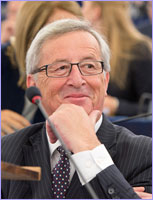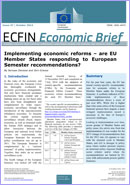|
|
|
|
|
|
 |
 |
 |
 |
European Parliament conducts hearings of candidates for the Juncker Commission
Pierre Moscovici, whom Commission President-elect Jean-Claude Juncker has nominated for the position of Commissioner for Economic and Financial Affairs, Taxation and Customs Union, participated in a hearing of the European Parliament on 2 October and was subsequently asked to respond to a set of written questions. Nominee for Vice President for Jobs, Growth, Investment and Competitiveness, Jyrki Katainen had his hearing on 7 October, and the nominee for Vice President for the Euro and Social Dialogue, Valdis Dombrovskis, had his hearing on 6 October. The European Parliament will vote whether or not to approve the complete list of candidates on 22 October.
|
 |
 |
 |
|
 |
|
|
|
|
 |
 |
 |
 |
President Barroso calls for comprehensive effort at Milan employment summit
European Commission President Manuel Barroso urged EU leaders to live up to their budget commitments at a special summit on employment held in Milan on 8 October. Barroso underlined the importance of the EU’s EUR 1 trillion budget in helping to combat unemployment, in particular youth unemployment, such as through the Youth Guarantee, to which all Member States have signed up and for which all have submitted implementation plans. President Barroso also called for greater flexibility in the EU budget and underscored the need to implement structural reforms. Before the summit, EU labour ministers discussed ways to accelerate and improve implementation of the Youth Guarantee. Member States are planning to spend over EUR 40 billion from the European Social Fund (ESF) in 2014-20 on measures to support implementation of the Youth Guarantee. The Youth Employment Initiative, worth EUR 6.4 billion in 2014-15, is available to top-up ESF money in Member States where regional youth unemployment rates exceed 25% (currently 20 countries). By December, close to EUR 810 million will have been spent cumulatively, supporting over 830,000 young people, while so far only two countries – France and Italy – have created dedicated operational programmes which the Commisison approved for France on 3 June and for Italy on 11 July.
|
 |
|
 |
 |
|
 |
 |
 |
 |
Economic Sentiment decreases in the euro area and the EU
In September, the Economic Sentiment Indicator (ESI) decreased in both the euro area (by 0.7 points to 99.9) and the EU (by 1.0 point to 103.6). The euro-area indicator fell slightly below its long-term average of 100, which it had surpassed only in December 2013. The negative developments in the indicators mainly reflect the more cautious views of consumers and the retail trade sector. In the euro area, lower readings for retail trade and consumer confidence were only partly offset by positive signals from the construction sector. Amongst the largest euro-area economies, sentiment increased only in Spain (+0.5), while it remained broadly flat in the Netherlands (+0.3), France (+0.2) and Germany (-0.3) and decreased in Italy (-0.9). With sentiment slipping in the largest EU economies outside the euro area (UK: -0.9, Poland: -0.4, Sweden: -2.6), the EU headline indicator decreased somewhat more in the EU (-1.0) than in the euro area. Slipping industry confidence (-1.0) was the main sector difference compared to euro-area results.
|
 |
|
 |
 |
|
 |
 |
 |
 |
ECB announces operational details of asset-backed securities and covered bond purchase programmes; keeps rates unchanged
The European Central Bank (ECB) has announced the operational details of its asset-backed securities and covered bond purchase programmes. The programmes detailed on 2 October will last two years and are designed to enhance the transmission of monetary policy, support the provision of credit to the euro area economy and, as a result, provide further monetary policy accommodation to complement fiscal policies and structural reforms. The Eurosystem’s collateral framework – the rules that lay out which assets are acceptable as collateral for monetary policy credit operations – will be the guiding principle for deciding the eligibility of assets to be bought under the purchase programmes. Asset purchases will commence with the purchase of covered bonds in the second-half of October 2014. In separate news, the ECB decided to leave its main interest rates unchanged. Combined with the low rates, the purchase programmes are expected to have a sizeable impact on the Eurosystem’s balance sheet and contribute to a return of inflation rates to levels closer to 2%.
|
 |
|
 |
 |
|
 |
 |
 |
 |
ECFIN website: new interactive timeline explains EU economic governance and links to background information
The EU’s economic governance framework aims to detect, prevent, and correct problematic economic trends that can stunt growth and put economies at risk. Read more about it on our economic governance pages. The EU’s economic governance has been reinforced and refined over time, evolving in the context of historical developments. The new interactive timeline provides a useful overview of the evolution of economic governance and includes links to legislation and background information.
|
 |
|
 |
 |
|
 |
 |
 |
 |
7th round of Transatlantic Trade and Investment Partnership (TTIP): EU reiterates commitment to maintain standards for protection
On 3 October, EU and US officials ended the 7th round of weeklong negotiations in Washington, D.C. on the Transatlantic Trade and Investment Partnership (TTIP), a new EU-US trade and investment deal. Negotiations focused on the regulatory pillar, both horizontal issues such as regulatory coherence and specific sectors such as pharmaceuticals, cars, chemicals and engineering. Regarding standards, the EU’s Chief TTIP Negotiator, Ignacio Garcia Bercero, reiterated the EU’s “unequivocal and firm commitment” that “nothing will be done which could lower or endanger the protection of the environment, health, safety, consumers or any other public policy goals pursued by EU or US regulators.” Negotiators also discussed rules governing energy and raw materials; customs and trade facilitation; intellectual property rights, and SMEs. Services were also discussed, with each side explaining the elements of their respective offer. Bercero noted that under the EU’s approach, governments would remain free to decide at any time that certain services should be provided by the public sector. To further promote transparency in the public debate, the EU Council on 9 October made the TTIP negotiation mandate public. Karel De Gucht, the Commissioner in charge of the negotiations, expressed his appreciation as "it allows everyone to see precisely how the EU wants this deal to work, so it contributes to economic growth and job creation across Europe while keeping our commitment to maintain a high level of protection.”
|
 |
|
 |
 |
|
|
|
|
 |
 |
 |
 |
Implementing economic reforms – are EU Member States responding to European Semester recommendations? Economic Brief 37.
For the past four years, the EU has issued country-specific recommendations for economic reform to its Member States under the European Semester. An indicator of EU-wide implementation of these recommendations shows a score of just over 40%. While this is higher than what some critics of the European Semester process have claimed, more stringent implementation is needed in the face of Europe’s economic challenges. Looking at implementation over time and across groups of Member States and policy areas, this article finds that implementation of the 2013 recommendations was weaker than it was for the 2012 ones, and that it varies with the electoral cycle in Member States. Moreover, implementation is stronger in policy areas where market pressures require an imminent policy response (e.g. banking sector reform) and/or where the recommendations are backed by EU rules with enforcement powers (e.g. public finances).
|
|
 |
|
|
|
|
 |
 |
Poland's success story |
 |
 |
 |
 |
 |
The Polish economy has grown impressively over the last two decades. During that period, living standards (in terms of GDP per capita) more than doubled, a process which accelerated when Poland joined the European Union in 2004. |
 |
 |
|
|
|
|
|
|
|
|
|
|
|
|
|
|
 |
| Directorate-General for Economic and Financial Affairs |
 |
|